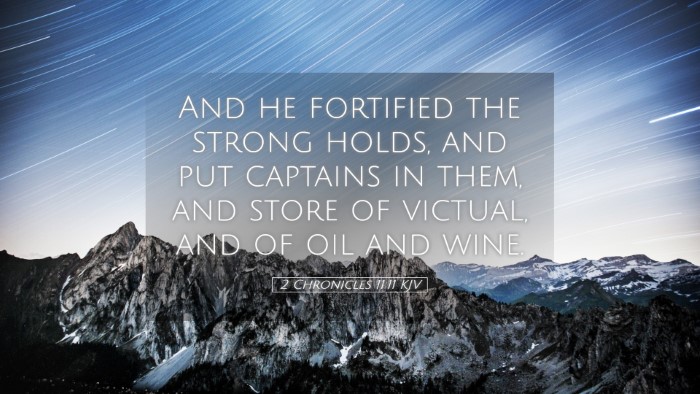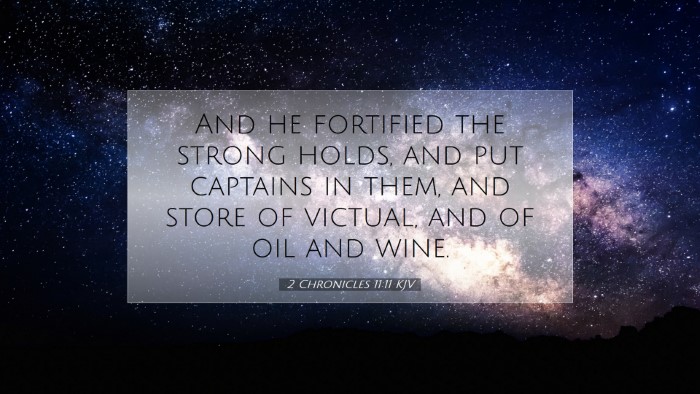Commentary on 2 Chronicles 11:11
Verse Reference: 2 Chronicles 11:11 - "And he fortified the strong holds, and put captains in them, and store of victuals, and of oil and wine."
Contextual Background
In 2 Chronicles 11, we encounter Rehoboam, the son of Solomon, as he solidifies his rule after the division of the kingdom of Israel. This chapter illustrates Rehoboam’s strategy to strengthen his position against both internal and external threats. The verse in focus highlights the measures he took to enhance the defenses of Judah.
Fortifications and Military Preparations
Rehoboam's actions of fortifying the strongholds speak to his understanding of the necessity for military preparedness. According to Matthew Henry, these measures were not merely for show but were critical for the preservation of his reign against potential invasions from Israel and other neighboring kingdoms.
Significance of Strongholds: The strongholds built by Rehoboam serve as a symbol of the importance of spiritual and physical strength. Just as he fortified physical structures, modern leaders and believers are encouraged to build spiritual strongholds in their lives—prayer, faith, and community are essential to face challenges.
Leadership and Strategy
Albert Barnes emphasizes that the appointment of captains reflects a wise leadership strategy. Leadership requires not only vision but the practical execution of plans through competent individuals. Rehoboam's choice to place captains in charge of these strongholds showcases his intent to maintain order and unity in his realm.
- Delegation: Effective leaders must delegate authority. Captains were placed to oversee the fortified areas, allowing Rehoboam to focus on broader issues of governance.
- Readiness: The stores of victuals, oil, and wine were essential for sustaining an army and supporting the people during a siege, illustrating Rehoboam's foresight and planning abilities.
Symbolism of Provision
The mention of victuals, oil, and wine in this verse is significant both practically and symbolically. According to Adam Clarke, these provisions served not only as supplies for the soldiers but also as representations of the blessings of God. In the days of old, oil and wine were symbols of abundance, joy, and divine favor.
Spiritual Implication: This act of storing provisions can be likened to preparing spiritually for challenges that lay ahead. Just as Rehoboam stockpiled resources, believers today are called to fill their hearts with the Word of God and to cultivate the fruits of the Spirit to withstand adversity.
Theological Reflections
This verse serves as a poignant reminder of the dual responsibility of leaders: to protect their people and to provide for them. Rehoboam's actions emphasize that the role of leadership extends beyond power—it involves caretaking and nurturing the community.
- God's Sovereignty: While Rehoboam took these strategic measures, it is imperative to acknowledge that God's overarching plan and sovereignty confirm that human efforts are ultimately subject to divine will.
- Spiritual Readiness: Just as Rehoboam fortified his kingdom against the threats of the world, believers are called to be vigilant and prepared to confront the challenges of their faith in a world that often opposes biblical principles.
Conclusion
In summary, 2 Chronicles 11:11 presents profound lessons about the intersection of leadership, spiritual preparation, and God's provision. Through the insightful commentary of historical theologians, we see that just as Rehoboam fortified his kingdom against external threats, modern-day leaders and believers must also build defenses through faith, wisdom, and preparation. Every act of provisioning and fortification reminds us of the importance of both physical and spiritual readiness in the face of adversity.


